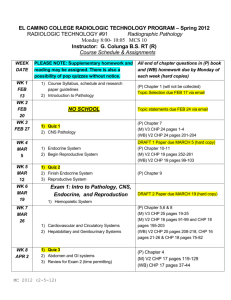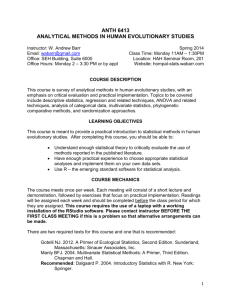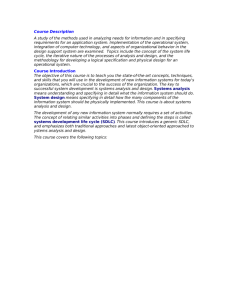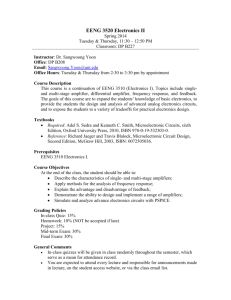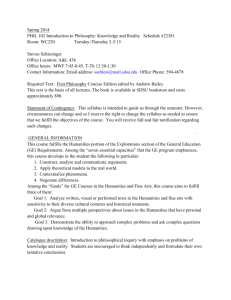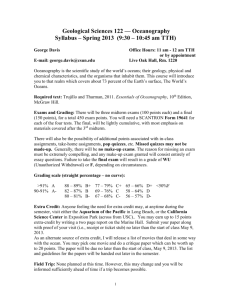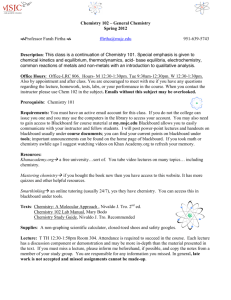EVST 4000 Syllabus Spring 2015
advertisement
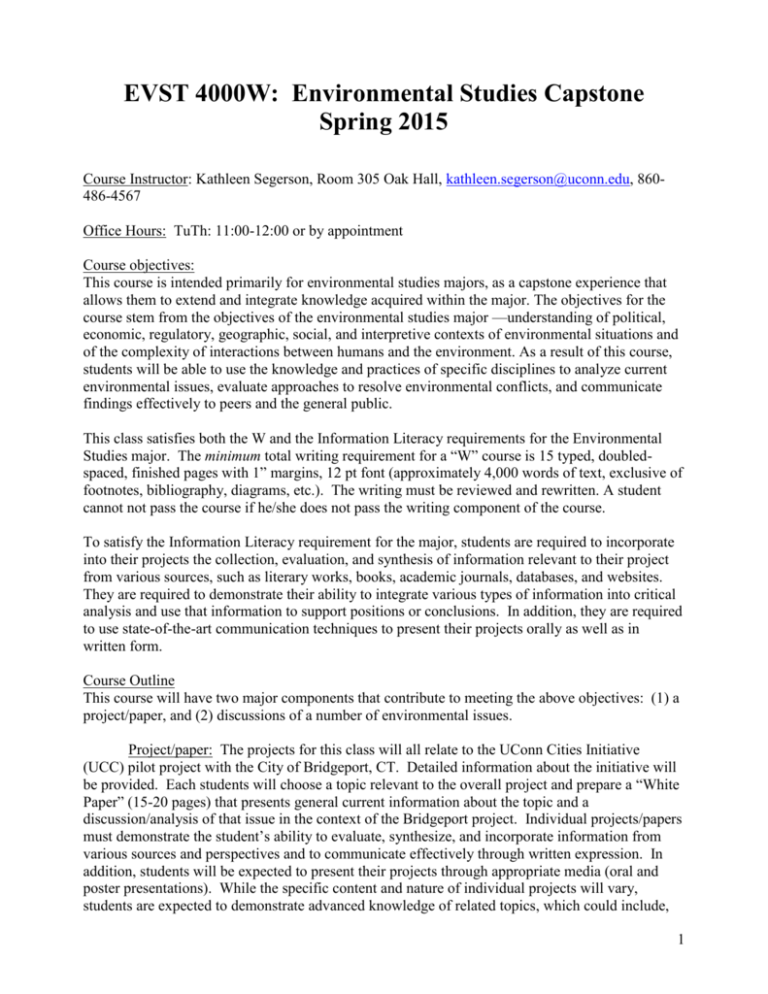
EVST 4000W: Environmental Studies Capstone Spring 2015 Course Instructor: Kathleen Segerson, Room 305 Oak Hall, kathleen.segerson@uconn.edu, 860486-4567 Office Hours: TuTh: 11:00-12:00 or by appointment Course objectives: This course is intended primarily for environmental studies majors, as a capstone experience that allows them to extend and integrate knowledge acquired within the major. The objectives for the course stem from the objectives of the environmental studies major —understanding of political, economic, regulatory, geographic, social, and interpretive contexts of environmental situations and of the complexity of interactions between humans and the environment. As a result of this course, students will be able to use the knowledge and practices of specific disciplines to analyze current environmental issues, evaluate approaches to resolve environmental conflicts, and communicate findings effectively to peers and the general public. This class satisfies both the W and the Information Literacy requirements for the Environmental Studies major. The minimum total writing requirement for a “W” course is 15 typed, doubledspaced, finished pages with 1” margins, 12 pt font (approximately 4,000 words of text, exclusive of footnotes, bibliography, diagrams, etc.). The writing must be reviewed and rewritten. A student cannot not pass the course if he/she does not pass the writing component of the course. To satisfy the Information Literacy requirement for the major, students are required to incorporate into their projects the collection, evaluation, and synthesis of information relevant to their project from various sources, such as literary works, books, academic journals, databases, and websites. They are required to demonstrate their ability to integrate various types of information into critical analysis and use that information to support positions or conclusions. In addition, they are required to use state-of-the-art communication techniques to present their projects orally as well as in written form. Course Outline This course will have two major components that contribute to meeting the above objectives: (1) a project/paper, and (2) discussions of a number of environmental issues. Project/paper: The projects for this class will all relate to the UConn Cities Initiative (UCC) pilot project with the City of Bridgeport, CT. Detailed information about the initiative will be provided. Each students will choose a topic relevant to the overall project and prepare a “White Paper” (15-20 pages) that presents general current information about the topic and a discussion/analysis of that issue in the context of the Bridgeport project. Individual projects/papers must demonstrate the student’s ability to evaluate, synthesize, and incorporate information from various sources and perspectives and to communicate effectively through written expression. In addition, students will be expected to present their projects through appropriate media (oral and poster presentations). While the specific content and nature of individual projects will vary, students are expected to demonstrate advanced knowledge of related topics, which could include, 1 for example, consideration of political and social costs of an environmental issue; debate of ethical dilemmas, deliberation on social justice components, analysis of media coverage, review of scientific data, estimation of impact of public opinion and beliefs. Note: Papers that are deemed to be of sufficiently high quality will be shared with city and other officials involved in the City of Bridgeport project. Discussion Topics: Most environmental issues are controversial. Each week we will discuss one such issue. The purpose is not to resolve the controversies, but to analyze them so as to understand them better. The specific topics are listed on the schedule. For each topic, all students will be required to read the corresponding material in the Taking Sides collection, which presents opposing views on the various topics. In addition, for each topic 2-3 students will be responsible for preparing additional materials and leading the discussion. (Each student will serve as a leader for three topics.) Each leader will be expected to: Identify two statements from each side of the debate that represent a “fact” and two statements that represent a “value judgment” (total of 8 statements) For each of the four “facts”, find a peer-reviewed scholarly research paper that either supports or refutes that “fact” and write a paragraph summarizing the study (including its results) For each of the four “value judgments”, write a brief paragraph discussion what value/goal/objective/concern is reflected in the statement Prepare a discussion question to pose to the class As noted, the main reading for the discussions will be taken from a customized collection of reading in Taking Sides, which will be available electronically to all students. More information on obtaining this collection will be provided. Grading Assignments as Discussion Leader Participation in Discussion of Issues Research Paper Final Oral and Poster Presentation 30% 15% 40% 15% 100% Late Penalties: Students are expected to hand in their writing assignments (drafts and final versions) on time. Except in exceptional circumstances, late assignments will be assessed late penalties. University Writing Center In addition to the instruction provided in class and through individual consultations, all students are encouraged to visit the University Writing Center for individualized tutorials. The Writing Center staff work with students at any stage of the writing process, from exploring ideas to polishing final drafts. Their first priority is guiding each student's revisions, so they frequently provide a sounding board for a writer's ideas, arguments, analytical moves, and uses of evidence. They can also work with you on sentence-level concerns, but please note that they will not proofread for you; instead, they will help you become a better editor of your own work. You should come to the Center with a copy of the assignment you are working on, a current draft (or notes if you are not yet at the draft stage), and ideas about what you want out of a session. For hours, locations, and more information, please go to writingcenter.uconn.edu. 2 A Note about Citation, Plagiarism and Academic Misconduct: Any time you write, you are required to identify material and ideas taken from other writers. This involves proper citation of sources. Citation must be provided not only for direct quotes, but even for ideas that are paraphrased (unless it is a well-known, commonly accepted idea). Failure to provide proper attribution of another person’s words or ideas constitute plagiarism and is a serious academic offense. In addition, taking material directly from a source and simply changing a few words is also plagiarism. I will provide inclass information to help students understand and avoid plagiarism, but ultimately the student is responsible for ensuring that the work s/he hands in is not plagiarized in any way. More information about plagiarism is available at http://irc.uconn.edu/PlagiarismModule/intro_m.htm and http://www.lib.uconn.edu/instruction/PlagFac.htm . Procedures regarding the imposition of penalties for plagiarism cases are described in the Student Code of Conduct. In addition, the UConn Policy on Academic Misconduct (see http://web.uconn.edu/mcb201/misconduct.html ) defines academic misconduct to include “presenting the same or substantially the same papers or projects in two or more courses without the explicit permission of the instructors involved.” Thus, if there is any relationship between a written assignment for this class and a paper or assignment you are writing for another class, you need to discuss it with me. Failure to do so will result in serious academic misconduct charges and penalties. 3 Preliminary Schedule Date Tuesday Date Thursday Jan 20 Overview of class Jan 22 Overview of Bridgeport Project Note: We will meet in Room 002, WBY Jan 27 Types of writing; Types of questions; Evaluating sources; Discussion of Possible Topics Jan 29 Discussion Topic 1: Precautionary Principle (TS, Chp 1) Feb 3 Research paper overview (requirements); Evaluating writing (rubric); Outline and organization of research papers; Feb 5 Discussion Topic 2: Environmental Racism (TS, Chp 2) Feb 10 No Class (Make-up: Teale Lecture, March 26) Feb 12 Discussion Topic 3: Vegetarianism (TS, Chp 3) Feb 17 No Class (Make-up: Teale Lecture, April 16) Feb 19 Discussion Topic 4: Pricing Ecosystem Services (TS, Chp 4) Feb 24 Presentations of paper topics, outlines, and preliminary reference lists Feb 26 No Class 4:00 Teale Lecture, Konover Auditorium Seth Borenstein, “Dispatches From a Hotter Planet and a Cooler Cosmos” Mar 3 Plagiarism, documentation, citation, quotation, paraphrasing Mar 5 Discussion Topic 5: US Global Warming Policy (TS, Chp 5) Mar 10 Improving your writing: Structure of paragraphs & sentences; grammar & punctuation Mar 12 Discussion Topic 6: Offshore Oil/Shale Gas (TS, Chps 6&7) Mar 17 No Class (Spring break) Mar 19 No Class (Spring break) Mar 24 Drafts of papers due; In-class peer review Mar 26 Discussion Topic 7: Biofuels (TS, Chp 8) 4:00 Teale Lecture, Konover Auditorium Gregg Mitman, "Ecological Imperialism Revisited: Entanglements of Disease, Commerce, and Knowledge in a Global World" Mar 31 No class: Drafts returned in individual consultations (Times TBD) Apr 2 Discussion Topic 8: Other Renewable Energy Sources (TS, Chp 9) Apr 7 Revising papers Apr 9 Discussion Topic 9: Commercial Fishing (TS, Chp 11) Apr 14 Preparation of posters Apr 16 Discussion Topic 10: Global Water Supply (TS, Chp 12) 4:00 Teale Lecture, Konover Auditorium Tyrone Hayes, From Silent Spring to Silent Night: A Tale of Toads and Men” Apr 21 Paper/poster Presentations Apr 23 Discussion Topic 11: BPA (TS, Chp 10) Apr 28 Paper/poster Presentations Apr 30 Discussion Topic 12: Population (TS, Chp 13) Thurs. May 7 Last time to hand in final paper: no later than 1:00 pm (submit draft and final) 4


